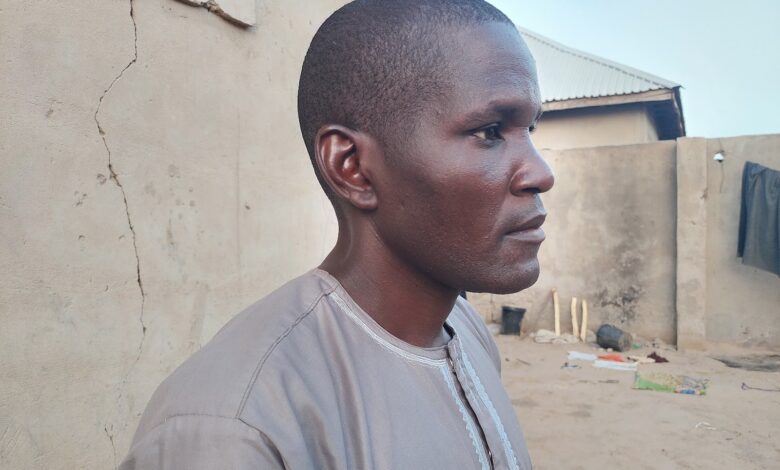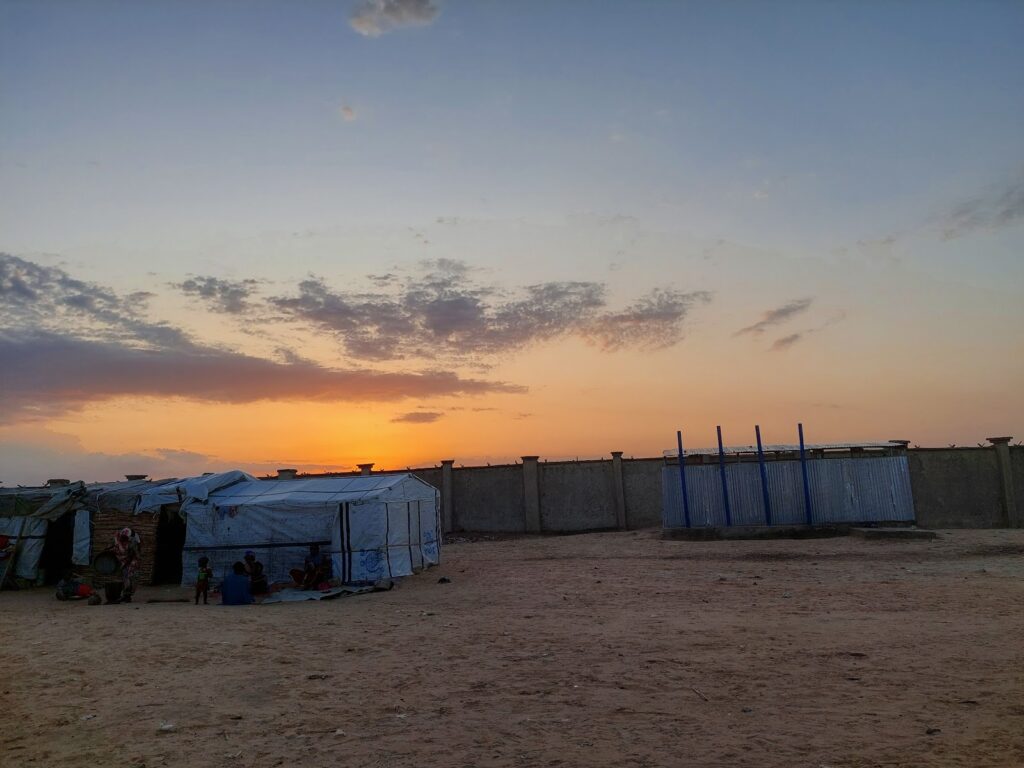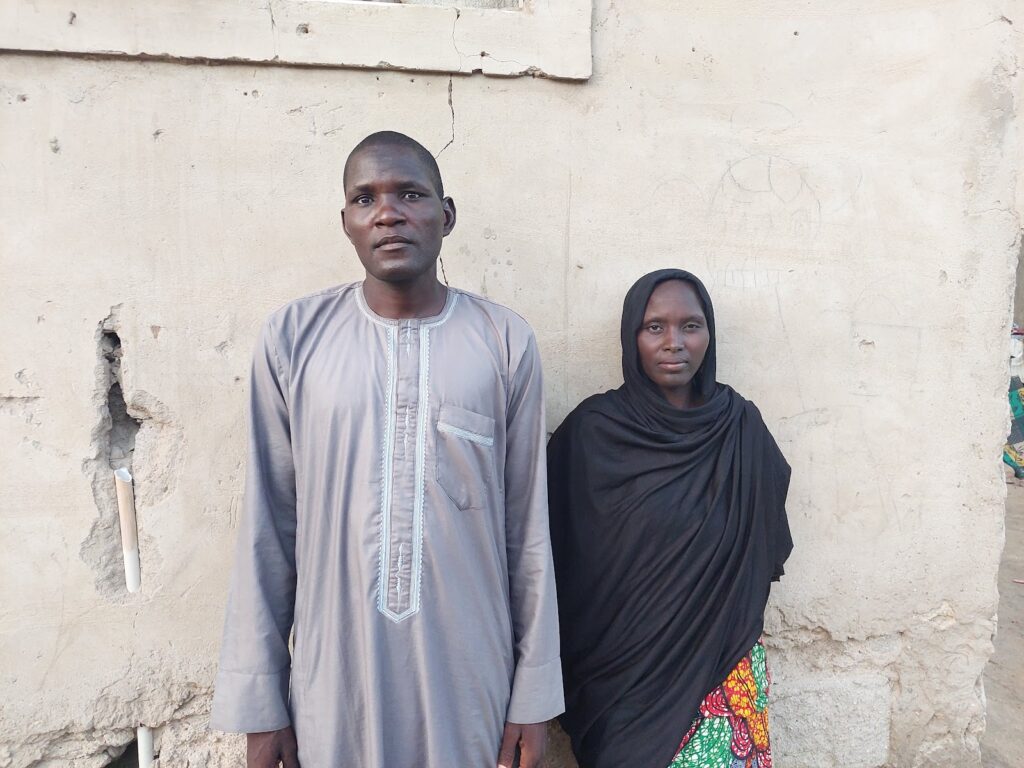A Farmer’s Troubled Return From De-Radicalisation Camp
Participants in Nigeria's deradicalisation programme include people arrested in mass raids and kept for years without trial. When they come home they struggle with the trauma and to keep their families in the face of how they have had to survive.

The question infuriated Abu Bulama. Those asking wanted an answer about what should be done, but to Abu, it seemed like an unfairly loaded question, one he could not benefit from any answer.
They asked about the naming ceremony of his wife’s newest child, a child she had conceived with another man. A child who had been born while he was in detention, arrested and held for six years without charge.
After he had been arrested, his family did not know where he was, or if he was alive. Initially at least.
Now he was back, they wanted to know if he would do the naming ceremony for the child of his wife. A child that wasn’t his.
“Do whatever you like,” was his dismissive reply.
Abu recalled another loaded question he was asked, as he fled from his village, six years before.
“What do you do?” the soldier barked at the men gathered at Banki.
“We are farmers,” some members of the group replied.
“Then, you are worse than those with guns! You are the ones feeding them since they have allowed you to stay with them.”
Abu Bulama recalls this was how the conversation went between the group of fleeing villagers and soldiers interrogating them. He and other internally displaced men had been arbitrarily arrested.
Boko Haram had flooded Ejilije, in central Borno in 2014, forcing the locals to live with the insurgents. Abu realised the insurgents could execute them for breaking their rules, or they could be killed by soldiers trying to reclaim the area. Abu, his two wives, children, and parents, fled their village. His family were among at least 50 who escaped to Banki, the second largest town in the local government area. They left because staying could get them killed.
In Banki, the soldiers asked why they didn’t leave earlier. The same question would be asked later by a military commander, perhaps a sign of what was coming.
Despite escaping the insurgents, their life was about to take a horrifying twist. They were camped in a house, and after six days, 300 people, including women and children, were transferred by the military to a prison in Bama town. The women and children were separated from the men. They received mats and soap, and were moved to a displacement camp in the same town.
After two days in custody, Abu remembers the group of men being interrogated by an army commander. The commander said they had to have been Boko Haram members, since they did not leave their community earlier. He also said the insurgents would have killed them if they were not members. Abu says they were beaten to force them to accept links to the terror organisation.
“They said we must agree that we were Boko haram. When it was too much, we consented. So they brought a vehicle and took us to Giwa barracks. We were 24,” he says as he explains the ordeal.
At Giwa barracks, the cells were congested and there wasn’t enough food or water. In Abu’s cell, several people died in a day, some days as many as four. Abu was at the facility for six months, after which the authorities moved him to Borno Maximum-security Prison.
“They told us we were going to be trained on skill acquisition at Gombe. They interviewed us at midnight, and after a week, they came late at night and took 775 of us to maximum prison,” Abu narrates. He says the authorities misled them to think they would soon be reunited with their families.
He spent six years at the maximum security prison. He recalls it had better ventilation than Giwa Barracks. The food was, however, poor. Even so, 25 people died during his time there.
Military intelligence interrogated them again. Everyone protested their innocence. Previous confessions in Bama were a result of torture they said. Abu, however, observed some of the detainees were truly Boko Haram associates.
On the morning of their release from prison, the authorities flew about 180 of the detainees to Gombe onboard a military aircraft for enrollment into Operation Safe Corridor, hosted at a fortified facility in Mallam Sidi. Nigeria launched Safe Corridor in 2016 to deradicalise lower-cadre Boko Haram members, but as many reports have shown, people fleeing the insurgents were rounded up and forced into the programme.
“This is Operation Safe Corridor, and we will teach you that what you were doing was bad, and we will change your thoughts.” Abu says these were the welcoming remarks upon their arrival. They were also told they would be reunited with their families in six months and were warned against misbehaving.
The food in Gombe was better, “but the quantity was smaller than the food at the maximum-security prison” he said. There was water too, and the accommodation was more comfortable. Their dormitory had ceiling fans and 30 bunk beds for 60 people in each room. The halls also had eight toilets and eight shower rooms.

The daily routine was; opening the doors at 5 a.m. Breakfast, including spaghetti, bean cake, porridge, or tea and bread, was served at 8 a.m. Lunch, served at 12:30 p.m., was either garri or maize flour. The last food for the day was brought in coolers by 4 p.m. and was served after the evening Muslim prayer.
They participated in religious and social activities. There were workshops on shoemaking, welding, barbing, tailoring, and laundry. Abu enrolled in the shoemaking class. There were enough materials, but the space was too small, which made the authorities divide the participants into batches.
An integral part of the programme was the religious studies held daily in the evening. They involved Islamic studies covering the Quran, Tafseer, and other studies.
There were also Christian sessions for four participants from Adamawa and Gamboru in Borno, whose path to the programme was unclear.
In that batch, there were 324 participants, some brought from Giwa barracks. Others were from detention facilities in Niger and Adamawa states. There were participants from a programme Abu describes as dialogue, referring to the Sulhu initiative of the domestic intelligence agency.
Five months into the programme, the authorities allowed them to communicate with the outside world after the International Organization for Migration (IOM) staff collected details and phone numbers of relatives.
The “six-month” programme, however, ended up lasting 10 months.
The participants received ₦10,000 ($23) and a skill acquisition certificate. Afterwards, vehicles took them to the ‘Umaru Shehu’ rehabilitation facility in Maiduguri, a state facility that processes people from the deradicalisation programme and hands them over to relatives for reintegration. However, not everyone left the Gombe camp. About 34 people under the Sulhu programme were left behind.
At the Borno state-run facility, the government asked the newly “deradicalised” to invite their people. So Abu’s wife and younger brother came over. At the camp, the former detainees received another ₦10,000 as well as machines for shoemaking, tailoring, and welding.
Abu believes he benefited from the Gombe programme, explaining that “before I went there, I couldn’t even write my name, but now I can even write the name of our village.”

The 42-year-old regained freedom in May this year after graduating from Operation Safe Corridor.
Reuniting after forced separation
Abu’s family had not known if he was alive or dead until about four years into his detention at the maximum security prison in Borno. There had been no communication until some detainees fell sick and were taken to the hospital, where they had access to the outside world. They informed their families of other people from their communities who were in detention.
When he returned home, or returned to the place that looked like home, there was hardly any relief for Abu. He discovered that his family situation had changed dramatically. His wife had been living with another man, and now they had children together.
Enraged, but also powerless in the face of the reality his wife had to survive somehow, Abu struggled to adjust. “One of my wives had two children before I came, and she is pregnant again…” Abu said sadly. How was he supposed to feel? He withdrew from the world and refused to engage with the situation.
When his wife, Yidza Moduye, gave birth to the child that wasn’t his, he was asked if he would perform the naming ceremony, or if the biological father should. He responded dismissively, they could do whatever they wanted, did they ask him before? Why should they ask him anything now?
The situation was causing anger and distress to everyone. Although Abu was back, the wounds to his spirit were keeping him from any attempt to rejoin his family.
Matters took another serious turn when someone got the police to intervene. The person, who Abu did not name, wanted the police to force Abu to face up to the situation and either claim responsibility for the family, or let go.
He was invited to the police station and asked if Yidza was his wife, to which he replied “yes”. They then asked if he had divorced her. He said “no”. The questioning continued as he was asked what the waiting period was for a woman to remarry if the husband was missing.
“Four years,” Bulama told them. Then they asked how long he had been away, to which he replied: “six years and six months”.
But, Abu then made an argument the police seemed to find persuasive; the law governing remarrying after four years only applies when nothing is heard about the husband, which wasn’t the case with him. His family had known he was alive for the last two years at least. He further told the officers he had been sewing caps and sending money home.
At this point, the police asked about the wife’s relationship with the other man. The children’s father, who was also present at the police intervention, responded that he gave her shelter when she had no one.
The police decided to resolve the situation by arresting the other man and holding him for ten days. Abu decided he would remain married to his wife, and conceded that the man should take custody of the three children.
The police consider the matter resolved, but tensions still remain among the relatives.
For Yidza, having her husband back after six years has brought some relief. “I feel happy,” she says. When the first batch of detainees was released, she had checked, and he was not among them. “We found him [in the second batch] and we are happy about that.”
But the tough days are far from over for them. They have unresolved issues to settle and other problems waiting to be addressed. The husband doesn’t have work, and food aid has not been seen for a year now. Sometimes, they have nothing to eat.
Yidza’s options were affected by her lack of skill in sewing the traditional Zanna caps, a popular livelihood among displaced people. She stopped trying to make them and concentrated on other ways of making a living. To survive, she treks two to three kilometres to collect firewood from the bush and does menial work.
At that time, the Dalori camp where she resides was scheduled for closure. “They are spreading the news that the camp will be closed. We don’t have foodstuff, and there is nowhere we can get what to eat,” she tells HumAngle. The camp has now been closed and people are being moved out.
They were told that they would be informed whenever they started conveying people. However, Yidza did not want to return to Ejilije until it was safe to do so.
Support Our Journalism
There are millions of ordinary people affected by conflict in Africa whose stories are missing in the mainstream media. HumAngle is determined to tell those challenging and under-reported stories, hoping that the people impacted by these conflicts will find the safety and security they deserve.
To ensure that we continue to provide public service coverage, we have a small favour to ask you. We want you to be part of our journalistic endeavour by contributing a token to us.
Your donation will further promote a robust, free, and independent media.
Donate HereStay Closer To The Stories That Matter




